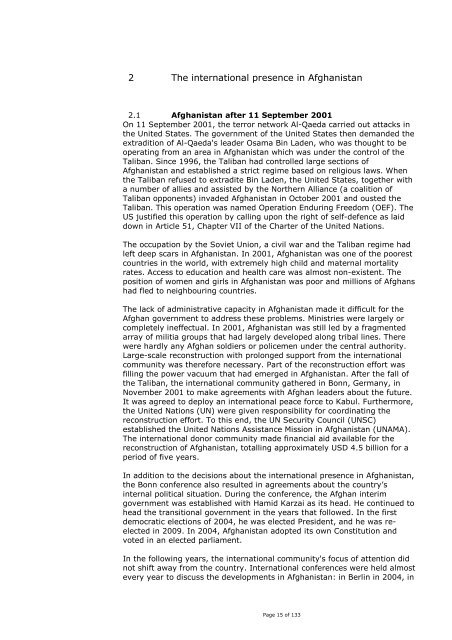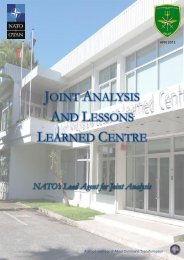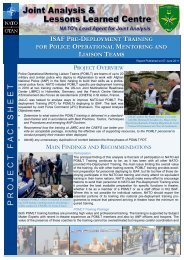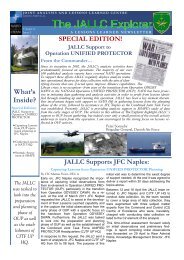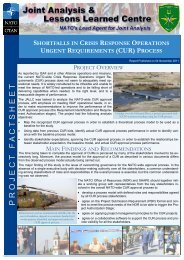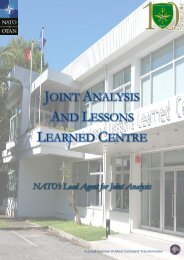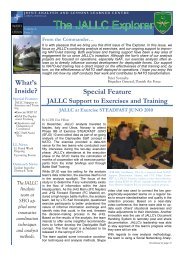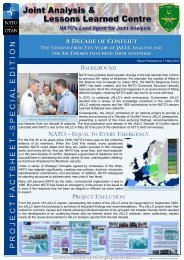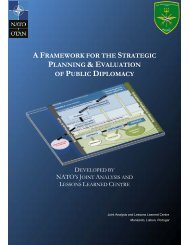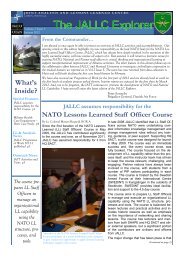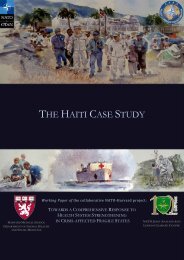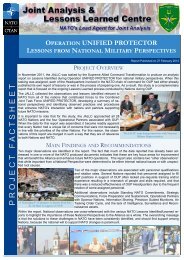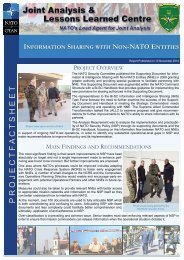Final evaluation Netherlands participation in ISAF 2006 - 2010
Final evaluation Netherlands participation in ISAF 2006 - 2010
Final evaluation Netherlands participation in ISAF 2006 - 2010
Create successful ePaper yourself
Turn your PDF publications into a flip-book with our unique Google optimized e-Paper software.
2 The <strong>in</strong>ternational presence <strong>in</strong> Afghanistan2.1 Afghanistan after 11 September 2001On 11 September 2001, the terror network Al-Qaeda carried out attacks <strong>in</strong>the United States. The government of the United States then demanded theextradition of Al-Qaeda's leader Osama B<strong>in</strong> Laden, who was thought to beoperat<strong>in</strong>g from an area <strong>in</strong> Afghanistan which was under the control of theTaliban. S<strong>in</strong>ce 1996, the Taliban had controlled large sections ofAfghanistan and established a strict regime based on religious laws. Whenthe Taliban refused to extradite B<strong>in</strong> Laden, the United States, together witha number of allies and assisted by the Northern Alliance (a coalition ofTaliban opponents) <strong>in</strong>vaded Afghanistan <strong>in</strong> October 2001 and ousted theTaliban. This operation was named Operation Endur<strong>in</strong>g Freedom (OEF). TheUS justified this operation by call<strong>in</strong>g upon the right of self-defence as laiddown <strong>in</strong> Article 51, Chapter VII of the Charter of the United Nations.The occupation by the Soviet Union, a civil war and the Taliban regime hadleft deep scars <strong>in</strong> Afghanistan. In 2001, Afghanistan was one of the poorestcountries <strong>in</strong> the world, with extremely high child and maternal mortalityrates. Access to education and health care was almost non-existent. Theposition of women and girls <strong>in</strong> Afghanistan was poor and millions of Afghanshad fled to neighbour<strong>in</strong>g countries.The lack of adm<strong>in</strong>istrative capacity <strong>in</strong> Afghanistan made it difficult for theAfghan government to address these problems. M<strong>in</strong>istries were largely orcompletely <strong>in</strong>effectual. In 2001, Afghanistan was still led by a fragmentedarray of militia groups that had largely developed along tribal l<strong>in</strong>es. Therewere hardly any Afghan soldiers or policemen under the central authority.Large-scale reconstruction with prolonged support from the <strong>in</strong>ternationalcommunity was therefore necessary. Part of the reconstruction effort wasfill<strong>in</strong>g the power vacuum that had emerged <strong>in</strong> Afghanistan. After the fall ofthe Taliban, the <strong>in</strong>ternational community gathered <strong>in</strong> Bonn, Germany, <strong>in</strong>November 2001 to make agreements with Afghan leaders about the future.It was agreed to deploy an <strong>in</strong>ternational peace force to Kabul. Furthermore,the United Nations (UN) were given responsibility for coord<strong>in</strong>at<strong>in</strong>g thereconstruction effort. To this end, the UN Security Council (UNSC)established the United Nations Assistance Mission <strong>in</strong> Afghanistan (UNAMA).The <strong>in</strong>ternational donor community made f<strong>in</strong>ancial aid available for thereconstruction of Afghanistan, totall<strong>in</strong>g approximately USD 4.5 billion for aperiod of five years.In addition to the decisions about the <strong>in</strong>ternational presence <strong>in</strong> Afghanistan,the Bonn conference also resulted <strong>in</strong> agreements about the country’s<strong>in</strong>ternal political situation. Dur<strong>in</strong>g the conference, the Afghan <strong>in</strong>terimgovernment was established with Hamid Karzai as its head. He cont<strong>in</strong>ued tohead the transitional government <strong>in</strong> the years that followed. In the firstdemocratic elections of 2004, he was elected President, and he was reelected<strong>in</strong> 2009. In 2004, Afghanistan adopted its own Constitution andvoted <strong>in</strong> an elected parliament.In the follow<strong>in</strong>g years, the <strong>in</strong>ternational community's focus of attention didnot shift away from the country. International conferences were held almostevery year to discuss the developments <strong>in</strong> Afghanistan: <strong>in</strong> Berl<strong>in</strong> <strong>in</strong> 2004, <strong>in</strong>Page 15 of 133


